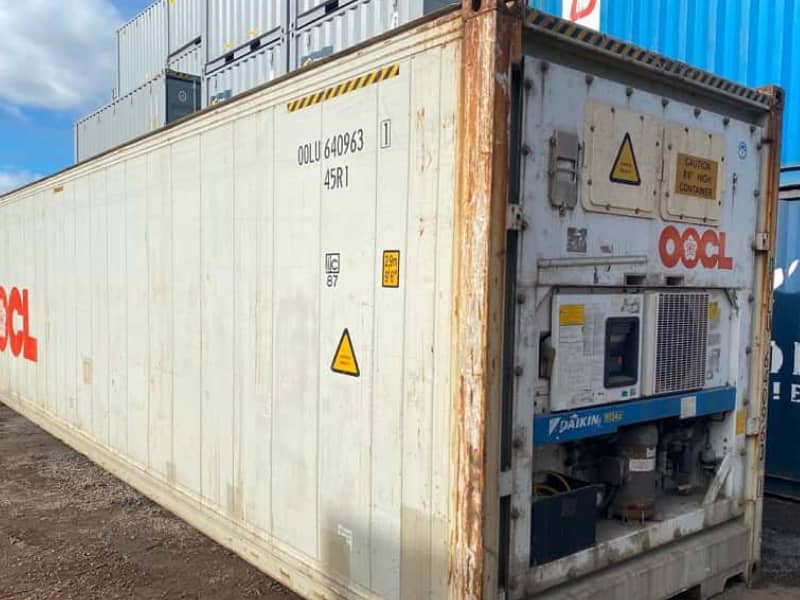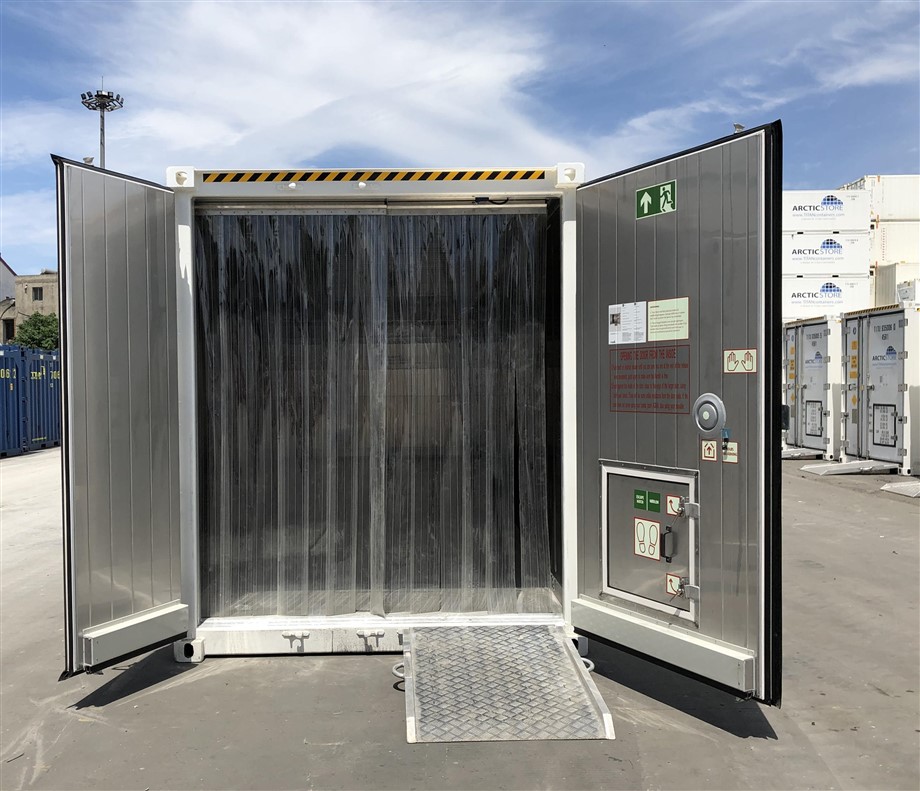Everything About Cold Store Containers: Vital Insights for Your Storage Space Demands
Cold store containers play a crucial function in the conservation of disposable products. They are available in numerous kinds, consisting of refrigerated and insulated units, each designed for details storage space needs. Understanding the advantages and vital features of these containers is crucial for businesses aiming to maximize their operations. As the need for effective storage space solutions grows, discovering the various options readily available can result in informed choices that impact both profitability and sustainability. What aspects should one think about when selecting the ideal container?
Sorts Of Cold Storage Containers
Cold store containers come in numerous types, each developed to fulfill specific temperature level control demands. Among one of the most usual kinds are chilled containers, which keep temperature levels in between 0 ° C to 10 ° C, making them ideal for disposable items like fruits, vegetables, and milk products. Another kind is the deep fridge freezer container, which runs at temperature levels listed below -18 ° C, perfect for long-term storage of frozen things such as meats and fish and shellfish.
Protected containers give temperature security without active air conditioning, making them beneficial for short-term transportation of temperature-sensitive products. Additionally, there are mobile cold store systems, which use versatility in locations and are often used in occasions or seasonal operations. Blast refrigerators rapidly reduce the temperature of hot foods, guaranteeing security and quality. Each type offers an unique purpose in different industries, from food solution to drugs, emphasizing the relevance of picking the right container for certain storage space demands.

Advantages of Using Cold Storage Solutions

In addition, cold storage options extend the service life of items, minimizing waste and increasing earnings for businesses. By successfully taking care of inventory with proper temperature control, firms can enhance their supply chains and improve functional efficiency.
Furthermore, cold store centers enable versatile storage options, fitting various quantity needs and seasonal variations in need (used 40ft refrigerated shipping containers). This flexibility assists organizations respond swiftly to market modifications
Utilizing chilly storage space remedies can guarantee conformity with health and security laws, protecting both customers and companies. On the whole, the tactical usage of cold store enhances product management while promoting sustainability and economic viability.
Secret Attributes to Seek in Cold Storage Containers
When choosing cool storage space containers, numerous essential attributes merit careful consideration to secure peak efficiency and dependability. Temperature level control abilities are essential; containers ought to preserve constant temperature levels ideal for particular items. Insulation top quality additionally plays a significant function, as remarkable insulation minimizes energy usage and enhances temperature security.
Next off, simplicity of gain access to and loading is important; containers should provide straightforward layouts for reliable handling and company. Sturdiness is one more essential aspect; weather-resistant materials ensure durability and safeguard contents against environmental variables.
In addition, movement attributes, such as built-in wheels or lifting factors, facilitate transport, while personalized layouts enable for tailored storage space solutions.
Finally, checking systems, including temperature alarms and remote monitoring, provide real-time updates, making certain that problems stay suitable. By concentrating on these attributes, individuals can pick cold store containers that satisfy their operational demands efficiently.
Picking the Right Cold Store Container for Your Requirements
Choosing the best chilly storage container needs a thoughtful assessment of functional demands and certain requirements. Factors such as the kind of items being stored, temperature sensitivity, and quantity needs to be focused on. Perishable food items might demand containers with strict temperature level controls, while pharmaceuticals might require exact conditions to preserve efficiency.
Additionally, possible customers must take into consideration the container's dimension and flexibility. A larger system might be needed for bulk storage, while smaller, portable alternatives could be suitable for momentary or on-site demands. Insulation high quality and energy efficiency are also vital, as these will original site certainly influence operational prices and temperature level stability.
Conformity with industry laws and requirements is necessary, specifically in industries like food and health care. By carefully evaluating these aspects, users can pick a cold store container that properly satisfies their one-of-a-kind requirements and warranties optimum storage space problems.
Best Practices for Keeping Freezer Conditions
Preserving ideal cool storage problems is essential for preserving the top quality and safety of temperature-sensitive products. On a regular basis keeping track of temperature level and moisture degrees is important; using trustworthy digital thermometers and hygrometers can supply precise analyses. Moreover, appropriate insulation of cool storage containers helps lessen temperature level changes and power loss.
Executing a first-in, first-out (FIFO) system ensures that older supply is utilized before newer supply, reducing waste (used 40ft refrigerated shipping containers). In addition, preserving an arranged design within the storage space enables for far better air flow and lessens the risk of cross-contamination
Regular upkeep checks on equipment, such as seals and compressors, are essential to prevent breakdowns. Staff training on finest methods for filling and discharging items helps preserve temperature integrity. Keeping doors closed as much as possible restrictions heat exchange, assuring that the cool storage environment continues to be steady and reliable in preserving valuable products.
Cost Considerations for Cold Storage Space Solutions
When examining cold store options, it is crucial to consider the first investment expenses together with recurring functional expenses. An extensive breakdown of these prices can reveal substantial lasting savings potential for services. Understanding these economic elements assists stakeholders make informed decisions regarding their cold store requirements.

Preliminary Financial Investment Prices
The economic landscape of freezer containers presents various initial financial investment prices that businesses need to take into consideration. These expenses normally consist of the purchase or rental price of the containers, which can differ based on dimension, type, and insulation quality. Furthermore, costs connected to retrofitting existing structures to accommodate freezer must be factored in, particularly if specialized tools is required. Installment expenses, including electric job and refrigeration systems, likewise add to the total preliminary financial investment. Companies need to not forget transport expenses for supplying containers to their wanted area. Potential customization choices, such as shelving or temperature level tracking systems, can further impact the initial economic investment. Careful budgeting for these elements is necessary for successful freezer implementation.
Operational Costs Malfunction
Operational expenditures for freezer services incorporate several essential cost considerations that organizations should navigate. Key variables include energy costs, which can be considerable due to the requirement to maintain reduced temperature levels. Upkeep expenses are also significant, as normal servicing is important to guarantee equipment runs effectively and continues to be compliant with health and security standards. Furthermore, labor expenses may occur from the requirement for specialized staff to check the storage space and handle atmosphere. Insurance policy expenses are an additional factor to consider, as companies must secure their financial investments against prospective losses. Any type of potential regulative conformity costs review have to be factored in, as organizations may need to invest in systems that stick to food security and ecological regulations. Comprehending these expenses is vital for efficient budgeting.
Long-Term Savings Possible
Buying freezer remedies uses significant long-term cost savings capacity, transforming initial expenses into financial effectiveness with time. By reducing putridity and waste, businesses can boost their earnings margins significantly. Advanced insulation and energy-efficient systems reduce energy costs, which build up over the lifespan of the tools. Furthermore, chilly storage containers commonly require much less regular maintenance compared to standard refrigeration approaches, causing lower fixing expenditures. The capacity to shop items for prolonged periods without jeopardizing quality permits companies to take advantage of market fluctuations, enhancing revenue. Additionally, the scalability of cold storage services makes it possible for business to adjust to changing demands without incurring excessive costs. In general, these variables add to a compelling case for cold store as a cost-efficient financial investment method.
Frequently Asked Concerns
How Much Time Can Food Be Stored in Cold Storage Space Containers?
The duration food can be stored Website in cold storage containers differs by type. Usually, subject to spoiling products last from days to weeks, while icy foods can remain safe for months, relying on proper temperature level and storage problems.
Are Cold Store Containers Energy-saving?
The energy performance of cold storage space containers varies based upon design and insulation quality. Modern systems usually utilize sophisticated modern technology to lessen power consumption, ultimately adding to lowered operational expenses and environmental influence in long-term use.
Can Cold Storage Containers Be Custom-made for Certain Demands?
Freezer containers can certainly be personalized to satisfy details demands. Modifications may consist of temperature level controls, dimension modifications, and extra functions, permitting individuals to customize options efficiently for various storage needs and functional choices.
What Are the Usual Dimensions of Freezer Containers?
Freezer containers commonly are available in typical dimensions such as 10, 20, and 40 feet. These measurements accommodate different storage space requirements, making certain flexibility for businesses needing temperature-controlled environments for disposable goods or sensitive materials.
Do Cold Store Containers Require Unique Authorizations for Usage?
Cold store containers usually call for special permits for usage, relying on regional laws and planned applications. Authorities may mandate licenses to ensure safety and security standards, environmental compliance, and correct operational methods are maintained during their use.
Cold storage space containers come in different kinds, each designed to fulfill specific temperature level control needs. Additionally, chilly storage space centers enable for flexible storage space alternatives, fitting numerous quantity requirements and seasonal variations in demand. Selecting the right chilly storage container needs a thoughtful evaluation of operational demands and certain requirements. The monetary landscape of cold storage space containers presents various preliminary investment costs that companies should think about. Cold storage space containers can certainly be customized to fulfill certain needs.